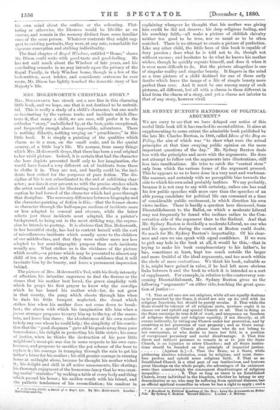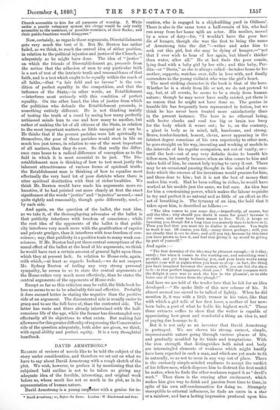MR. SYDNEY BUXTON'S HANDBOOK OF POLITICAL ARGUMENT.* WE are sorry
to see that we have delayed our notice of this useful little book till it has reached its second edition. It aims at supplementing to some extent the admirable book published by the late Mr. Charles Buxton, in 1866, called Ideas of the Day on Policy, the aim of which was "to show what were the actual principles at that time swaying public opinion on the more important questions of the day." Mr. Sydney Buxton deals less with the principles and more with the arguments. He does not attempt to follow out the arguments into illustrations, still .
less into ramifications. He tries to catch the "central stem" only from which the various forms of the argument proceed.
This he appears to us to have done in a very neat and workman- like manner, and certainly with no perceptible bias towards the side to which his own mind probably inclines. We say probably, because it is not easy to say with certainty, unless one has read his few public speeches with more care than the speeches of an able young candidate for political life can command at a time of considerable public excitement, in which direction his own views incline. There is hardly a question here discussed, from Disestablishment to the Ballot, on which a moderate Liberal may not frequently be -found who inclines rather to the Con- servative side of the argument than to the Radical. And that Mr. Sydney Buxton is decidedly a moderate Liberal, no one who read his speeches during the contest at Boston could doubt. So much for Mr. Sydney Buxton's impartiality. Of his clear- ness and care we can speak with equal confidence. If we were to pick any hole in the book at all, it would be this,—that in trying to make his book complementary to his father's, he has, sometimes at least, kept too much outside the larger and more fruitful of the ideal arguments, and too much within the circle d mere contentions. We think his book, valuable as it is, might have gained in value, if he had left more obvious links between it and the book to which it is intended as a sort of supplement. For example, in relation to the controversy con- cerning Disestablishment, Mr. Sydney Buxton gives us the following " arguments " on either side, touching the great ques- tion of justice :—
" 1. That as all men are not religions, while all are equally desirous to be protected by the State, it should not mix up its civil with its religious functions, but should be purely secular. 2. That while the State should be tolerant of all religious sects, nowhere ought it to choose out and uphold any special Church at all. That in doing so the State outstrips its true field of work, and trespasses on freedom of religious thought and religious equality, if not directly, at all events indirectly, by taking one Church under her protection, and by conniving at her possession of vast property ; and so State recog- nition of a special Church places those who do not belong to her communion, or who desire to leave her fold, in a position of exceptional pecuniary and social disadvantage. 3. That this direct and indirect pressure to remain in or to join the State Church, is an injustice to other Churches ; and all State institu- tions should be founded on the principle of impartial justice.
[Against it.]—L. That the State, as a State, while professing absolute toleration, must be religious, and must there- fore profess and uphold some religions faith. 2. That as an Established Church is a vital part of our institutions, and bestows great blessings on the whole people, the advantages of its existence more than counterweigh the consequent disadvantages of religions inequality 6 That so long as there is an Established Church, every individual in the kingdom, whether he belong to any denomination or no, who may be suffering from spiritual distress, has an official spiritual councillor to whom he has a right to apply ; and a * A Handbook to Political Questions of the Dal, being the Arguments on Either Side. By Sydney C. Barton. Second Edition. London : J. Murray.
Church accessible to him for all purposes of worship. 7. While under a purely voluntary system the clergy would be only really accessible to the members, or possible members, of their flocks; and their public functions would disappear."
Now, certainly, as regards those arguments, Disestablishment gets very much the best of it. But Mr. Buxton has rather failed, as we think, to reach the central idea of either position, in relation to the political injustice and justice of the Church, so adequately as he might have done. The idea of " justice " on which the friends of Disestablishment go, proceeds from the notion that the adhesion of men to any particular faith is a sort of test of the intrinsic truth and reasonablenss of that faith, and is a test which ought to be equally within the reach of all faiths,—that "a fair field and no favour" is the con- dition of perfect equality in the competition, and that the influence of the State,—in other words, an Establishment —interferes most seriously with this condition of perfect equality. On the other hand, the idea of justice from which the politician who defends the Establishment proceeds, is something entirely different. He is not thinking mainly of testing the truth of a creed by seeing how many perfectly unbiassed minds lean to one and how many to another, but rather of making the lot of all citizens of the State, in relation to the most important matters, as little unequal as it can be. He thinks that if the poorest parishes were left spiritually to themselves, the poor of those parishes would start in life on much less just terms, in relation to one of the most important of all matters, than they do now. So that really the differ- ence runs home to a radical difference of conception as to the field in which it is most essential to be just. The Dis- establishment man is thinking of how to test most justly the inherent attractiveness of various forms of spiritual truth; the Establishment man is thinking of how to equalise most effectually the very hard lot of poor districts where there is utter spiritual destitution with that of richer localities. We think Mr. Buxton would have made his arguments more ex- haustive, if he had pointed out more clearly at first the exact significance of the words "justice" and "injustice" as used,—and quite rightly and reasonably, though quite differently, used,— by each side.
And again, on the question of the ballot, the root idea, as we take it, of the thoroughgoing advocates of the ballot is that publicity interferes with freedom of conscience ; while the root idea of the opponents of the ballot is that publi- city interferes very much more with the gratification of caprice and private grudges, than it interferes with true freedom of con- science; nay, that publicity is a positive tonic to many weak con- sciences. If Mr. Buxton had put these central conceptions of the moral effect of the ballot at the head of his arguments, we think he would have cast a certain amount of general light upon them which they at present lack. In relation to Home-rule, again, with which,—at least as regards Ireland,—we do not suspect Mr. Sydney Buxton of feeling any very strong personal sympathy, he seems to us to state the central arguments of the Home-rulers very much more effectively, than he states the central arguments of the opponents of Home-rule.
Except so far as this criticism may be valid, the little book be- fore us seems to us to be admirably fair and effective. Probably it does succeed better in stating the negative than the positive side of an argument. The discontented side is usually easier to
grasp and to see the fall force of, than the contented side. The latter has roots and fibres already intertwined with the half- conscious life of the age, while the former has disentangled very effectually all its objections to what exists. But making fair
allowancefor this greater difficulty of expressing the Conservative side of the question adequately, both sides are given, we think, with equal ability and perfect equity. It is a very thoughtful handbook.







































 Previous page
Previous page